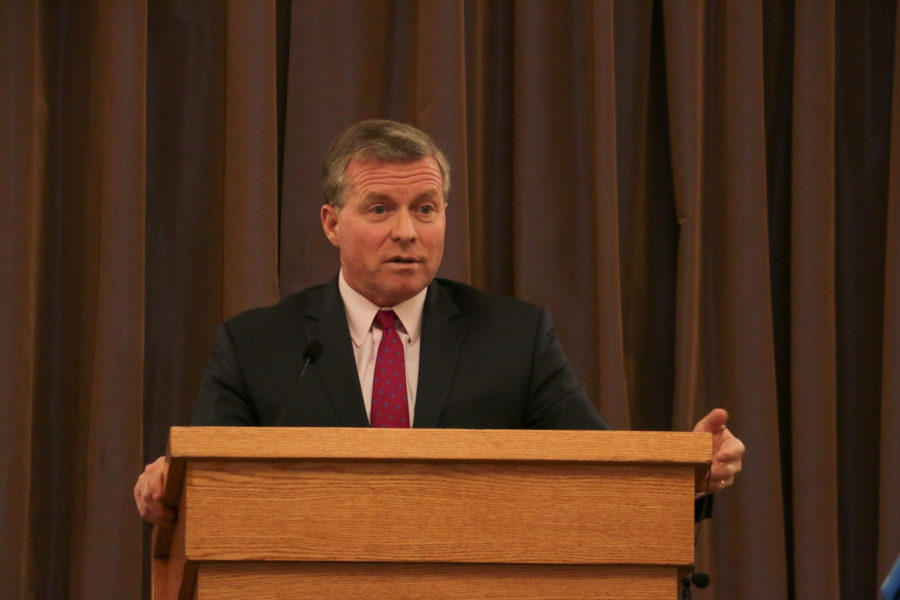Career politician shares experiences from the Capitol
Levko Karmazyn | Staff Photographer
Former congressman Charles Dent speaks about his time in the House of Representatives at Monday evening’s “American Politics in the New World Order” event.
February 26, 2019
With its rust-belt roots, flourishing corporate sector and robust student population, Pittsburgh’s diversity has made it a popular stop for politicians on the campaign trail.
But Charles Dent, a former U.S. congressman and career politician, didn’t come to Pitt to rattle off political sound bites. Instead, he shared 28 years worth of stories from the heart of America’s highest ranking political circles to the nearly 200 people who packed Ballroom B of the University Club Monday night.
Since day one of Dent’s political career in 1991, when he was elected to the Pennsylvania House of Representatives to represent his hometown of Allentown as a Republican, he said he’s tried to cultivate an image as a pragmatist and a moderate, which former Pitt Chancellor Mark Nordenberg acknowledged in his opening remarks.
“Raging moderates … as many have described Charlie Dent … is a term that might be viewed as critical by some in this current take-no-prisoners political environment, but it has a great deal of appeal for the rest of us,” Nordenberg said.
Dent said he came to Pitt to tell a more intimate story of the political drama most Americans can only view on their TV screens. He shared tales of stressful and lighthearted moments with presidents and spoke about his most grueling days on the House floor, before fielding questions from audience members about today’s hot-button political issues.
After being elected to the U.S. Congress in 2004, Dent co-chaired the Tuesday Group, a caucus of moderate Republicans dedicated to promoting fiscal responsibility, personal independence and a strong national defense. He also has fond memories of chairing the ethics committee for two years, a committee he said set the standard for practical decision-making in Congress.
“Most committees are either majority Republican or majority Democrat — not the ethics committee,” Dent said. “We made every decision on a consensus basis … because it simply feels unethical to compromise on values.”
As a pragmatist, Dent said he valued a confrontational approach to politics. Instead of arguing endlessly on the House floor, it’s important to communicate issues with top officials, he explained, launching into a story about negotiating with then-President George W. Bush during the Iraq War.
“The war wasn’t going well. It was clear that we’d bitten off more than we could chew and we needed to … re-evaluate our military strategy,” Dent said. “I stood in the Oval Office with President George W. Bush, Condoleezza Rice and about a dozen other elected officials and cabinet members and we had a candid conversation … The next night, it was all over the news.”
Dent said he’d like all political negotiations to be that simple, but American politics — especially at the national level and increasingly at the state level — has become more polarized than ever.
“I noticed [when I was elected in 1991] that Harrisburg could be painfully pragmatic — it often felt like there was nothing we couldn’t compromise on. Washington, on the other hand, was all about messaging. Politicians made a lot of empty speeches just to score political points … It was excruciatingly ideological … Unfortunately, now, Harrisburg looks a lot more like Washington,” Dent said.
This failure to compromise on the most basic issues — “a never-ending circuit of firing squads,” as Dent put it — was one of the main causes of the 2013 government shutdown, which Dent said was one of the most “futile and stupid” exercises in government history, until the most recent shutdown under the Trump administration.
Dent resigned in May of 2018 during the Trump administration, but he’s still involved with politics as a frequent commentator on CNN. He said he’s concerned about the direction the country’s headed.
“Donald Trump is not the first president to abuse executive governance. Since FDR’s administration, presidents on both sides have exercised more authority … but Trump’s disregard for the Constitution is perhaps the most concerning example I’ve seen,” he said.
According to Dent, Trump’s continued push for a border wall seems like a fruitless endeavor — and it’s not the most pressing emergency the American people should be concerned about.
“The only emergency there is the assault on Article I of the Constitution. First of all, if you’re gonna declare an emergency, the proposed solution has to actually fix the emergency,” Dent said. “A wall does nothing to change the fact that families and children from Mexico are displaced and have nowhere else to go.”
But despite painting a bleak picture of the current administration, first-year politics and philosophy major Tyler Viljaste, who went to lunch with Dent that afternoon, said Dent offered hope to younger generations.
“He did say it’s really hard to be a centrist and moderate in these times, but he wants good people to enter politics and fight for important causes instead of pushing party lines,” Viljaste said. “That’s something I think young people who want to see progress in their government can really resonate with.”
Nordenberg echoed Viljaste’s point, calling for more leaders in government who don’t view “compromise as a dirty word.”
“We look for leaders who do not consider people of the opposing political party enemies … who consistently seek common ground,” Nordenberg said. “We want leaders to represent those who have actually put them in office.”








